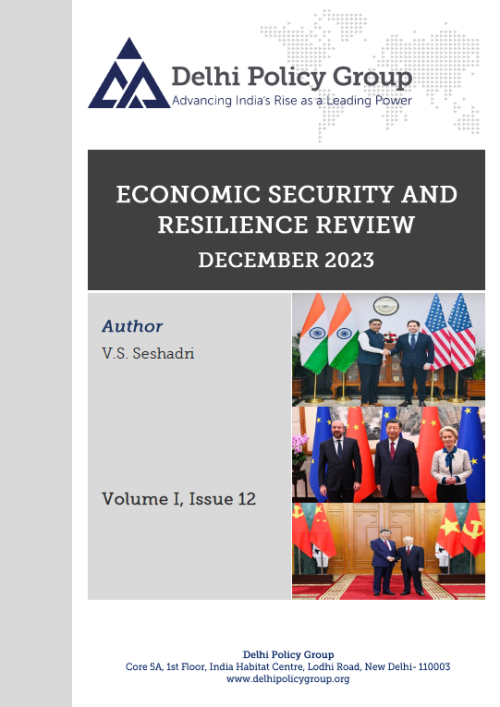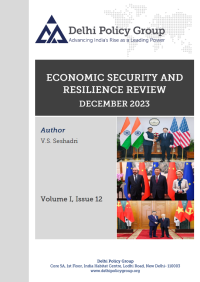Economic Security and Resilience Review
Date: January 05, 2024
This final issue of 2023 begins with a review the major developments during the year relating to economic security, resilience, and derisking, both in India and globally.
These trends continued to be in evidence in the December. The EU-China summit held on December 7, which followed a series of bilateral visits exchanged during the year, did not yield any major outcome. Rather, it seems to have resulted in an exchange of contrasting views and positions at the highest level about each other’s economic policies and practices, as well as derisking.
President Xi Jinping’s visit to Vietnam, on the other hand, was clearly an effort by China to draw its southern partner closer into its economic and infrastructure ecosystem, three months after a successful visit by President Biden to that country. Vietnam may well seek a balance between its ties with China and those with the West, and build itself as a buffer by securing trade and investment from all directions, thereby boosting its economic profile.
The month also saw the introduction of new economic security measures. China imposed a ban on export of rare earth processing technologies.
The US released proposed guidance clarifying ‘foreign entities of concern’ under its Inflation Reduction Act. The UK unveiled its own carbon border adjustment mechanism that will enter into force from the year 2027.
As for India, the mid-term review of the India-US initiative on critical and emerging technologies (iCET)saw the addition of a few more areas in its scope. There were reports about India moving to acquire lithium blocks in Argentina. The threat to economic security found inclusion in the definition of terrorism under the revised Bharathiya Nyay Samhita that was adopted by the Indian Parliament.
To read this ESRR, Vol. I, Issue 12, please see the PDF attached.
These trends continued to be in evidence in the December. The EU-China summit held on December 7, which followed a series of bilateral visits exchanged during the year, did not yield any major outcome. Rather, it seems to have resulted in an exchange of contrasting views and positions at the highest level about each other’s economic policies and practices, as well as derisking.
President Xi Jinping’s visit to Vietnam, on the other hand, was clearly an effort by China to draw its southern partner closer into its economic and infrastructure ecosystem, three months after a successful visit by President Biden to that country. Vietnam may well seek a balance between its ties with China and those with the West, and build itself as a buffer by securing trade and investment from all directions, thereby boosting its economic profile.
The month also saw the introduction of new economic security measures. China imposed a ban on export of rare earth processing technologies.
The US released proposed guidance clarifying ‘foreign entities of concern’ under its Inflation Reduction Act. The UK unveiled its own carbon border adjustment mechanism that will enter into force from the year 2027.
As for India, the mid-term review of the India-US initiative on critical and emerging technologies (iCET)saw the addition of a few more areas in its scope. There were reports about India moving to acquire lithium blocks in Argentina. The threat to economic security found inclusion in the definition of terrorism under the revised Bharathiya Nyay Samhita that was adopted by the Indian Parliament.
To read this ESRR, Vol. I, Issue 12, please see the PDF attached.



